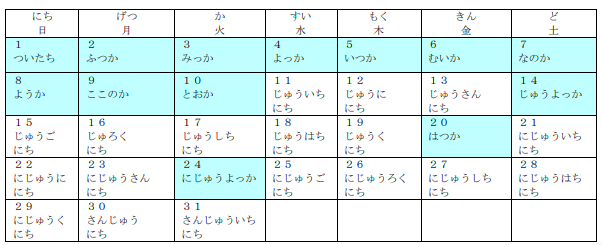3.1: Dialogue 1
- Page ID
- 31518
Michael:今日 きょう は何日 なんにち ですか。 Kyou wa nan-nichi desu ka. What date is it today?
Honda :ええっと、 八日 ようか じゃないですか。 Eetto, youka ja nai desu ka. Umm, isn’t it the 8th?
Michael:じゃ、締め切りまであと一週間 いっしゅうかん ですね。 Ja, shimekiri made ato is-shuukan desu ne. Then, it’s one week left until the deadline, right?
Honda : ええ、がんばりましょう。 Ee, ganbarimashou. Yes, let’s do our best. Michael:はい、一生懸命 いっしょうけんめい 、がんばります。 Hai, isshoukenmei ganbarimasu. Yes, I’ll go all out and do my best.
Vocabulary
nan-nichi なんにち 何日 what date? See 7-1-1
youka ようか 八日 8th (of the month) See 7-1-1
shimekiri しめきり 締め切り deadline
ato あと 後 remaining, left (with a quantity)
~shuukan 〜しゅうかん 週間 number of weeks See 7-1-2
is-shuukan いっしゅうかん 一週間 one week
isshoukenmei いっしょうけんめい 一生懸命 go all out, with utmost effort
Grammar Notes
Calendar time: Counting and Naming Dates
The classifier for both naming and counting days is: ka 日 か or nichi 日 に ち . When naming the days of the month, you only go up to the 31st, but when counting days you can go a lot higher. So, 50 nichi can only mean ‘fifty days’ while tooka can mean ‘the tenth of the month’ or ‘ten days.’ Please note the following:
• the first day of the month is tsuitachi (naming) while one day is ichi-nichi (counting).
• The Japanese number series with the classifier 〜ka is used up through ten, and then the Chinese number series with 〜nichi is used for the rest.
• two exceptions: hatsuka ‘the 20th’ or ‘twenty days’ and combinations ending with 4 such as juuyok-ka and nijuuyok-ka.
• Nan-nichi asks what date? or how many days? Please distinguish between ‘what day of the month’ nan-nichi and ‘what day of the week’ nan-youbi.
Days of the Month

Counting Weeks
The classifier for counting weeks is ~shuukan 週間しゅうかん . There is no naming classifier for weeks. Note the sound change (s ss) with 1, 8 and 10.
is-shuukan 一週間
いっしゅうかん
one week
ni-shuukan 二週間
にしゅうかん
two weeks
san-shuukan 三週間
さんしゅうかん
three weeks
yon-shuukan 四週間
よんしゅうかん
four weeks
go-shuukan 五週間
ごしゅうかん
five weeks
roku-shuukan 六週間
ろくしゅうかん
six weeks
nana-shuukan 七週間
ななしゅうかん
seven weeks
has-shuukan 八週間
はっしゅうかん
eight weeks
kyuu-shuukan 九週間
きゅうしゅうかん
nine weeks
jus-shuukan 十週間
じゅっしゅうかん
ten weeks
nan-shuukan 何週間
なんしゅうかん
how many weeks?


